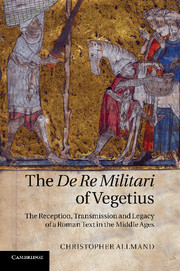 The De Re Militari of Vegetius
The De Re Militari of Vegetius from Part I - The medieval reception
Published online by Cambridge University Press: 07 October 2011
It is important to appreciate who owned manuscripts of the De re militari in the Middle Ages, and the reasons why they may have wished to do so. Individual owners are revealed by a number of different sources. Wills record texts belonging to particular individuals, as do inventories of goods drawn up after death. Library catalogues, on the other hand, often list the manuscripts owned by institutions, religious or educational, or by rulers who succeed one another through inheritance. Almost by definition, catalogues are concerned with collections of texts, often gathered over a long period of time. These seldom tell us about the tastes and interests of individuals in the way that a will, a very personal document, can do. They are more likely to reveal what the users of a particular library, the monks who constituted an established community for example, found interesting and useful over the generations it took to create the collection. Nor will they betray what individual readers thought of a particular text, except what they sometimes wrote, anonymously, in the margins. Yet such institutional copies are important for the way they may have ensured both the physical safety and a greater knowledge and appreciation of a particular text than of one held in a private library.
However, some manuscripts, particularly later ones, do reveal who copied them, and for whom, while the date (in particular) and place are often recorded. Very occasionally, too, we are even let into the secret of how much a manuscript cost its owner. Other, more general, factors can help in our search. Palaeographical evidence is often valuable. Occasionally an individual hand may be recognised and, when compared with other examples, can lead to the identification of a scribe. Styles of writing and illumination can reveal both dates and the broad geographical origins of the scribe and artist. Whether the text is written on parchment or paper is another indication of date, while watermarks may enable one to attach a date and an indication of geographical origins to a manuscript.
To save this book to your Kindle, first ensure no-reply@cambridge.org is added to your Approved Personal Document E-mail List under your Personal Document Settings on the Manage Your Content and Devices page of your Amazon account. Then enter the ‘name’ part of your Kindle email address below. Find out more about saving to your Kindle.
Note you can select to save to either the @free.kindle.com or @kindle.com variations. ‘@free.kindle.com’ emails are free but can only be saved to your device when it is connected to wi-fi. ‘@kindle.com’ emails can be delivered even when you are not connected to wi-fi, but note that service fees apply.
Find out more about the Kindle Personal Document Service.
To save content items to your account, please confirm that you agree to abide by our usage policies. If this is the first time you use this feature, you will be asked to authorise Cambridge Core to connect with your account. Find out more about saving content to Dropbox.
To save content items to your account, please confirm that you agree to abide by our usage policies. If this is the first time you use this feature, you will be asked to authorise Cambridge Core to connect with your account. Find out more about saving content to Google Drive.